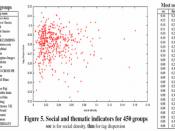Observational studies are a qualitative method of research. It is a method which we all, as members of society and inquirers into our own society and culture, have experience of in the sense that such an ability to observe and reflect on what is going on around is an essential part of our being competent in our culture. Observation aims to look further than this. (S. Ackroyd & J.Hughs: 127) It allows a researcher to study a group in its natural setting and, moreover, for far longer and in more depth than is possible with other research strategies.
There are two main types of observational methods that are participant observation, and non-participant observation. In participant observation, the researcher is actually involved in the lives of those being studied. This would involve him/her doing such things as looking, listening, recording and inquiring etc. The participant observer would take on a role, which can creditably be accommodated, in a social group being studied.
Interactive and interpretive perspectives of sociology tend to use the method of participant observation for their research, meanings are provided and actors help make sense of and interpret the world in which they live. (A. Bryman, 2001: 292) One of the main arguments for participant observation as a method of social research is that it allows the study of social actors in their natural habitats as opposed to the artificial circumstances in the laboratory of community life (S. Ackroyd & J. Hughs: 133).
One crucial decision that participant observers have to make before they start the research is how to approach the social group they join. The researcher will have to decide whether he/she will be an overt participant observer, where they declare their true identity and purpose, or a covert participant observer, where the fact that they are...


